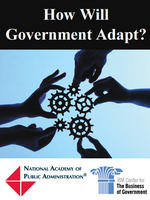
How Will Government Adapt?

The National Academy of Public Administration’s November 2014 annual meeting raised a number of key issues facing public administrators in coming years. The IBM Center for The Business of Government collaborated with the Academy to highlight some key findings and takeaways from that meeting.
The National Academy of Public Administration is an independent, non-profit, nonpartisan organization chartered by Congress in 1967 to assist government leaders in building more effective, efficient, accountable, and transparent organizations. Its 800 Fellows—who include former cabinet officers, Members of Congress, governors, mayors, and state legislators, as well as prominent scholars, business executives, and
public administrators—meet annually.
The focus of its 2014 meeting was “Public Administration 2025: How Will Government Adapt?” A series of speakers and panel sessions explored how what government does, and how it does it, will be different a decade from now. The goal of the meeting was to prepare public administrators at all levels to adapt to this changing environment.
Speakers from the Obama Administration included:
- Dan Tangherlini, Administrator, General Services Administration
- Beth Cobert, Deputy Director of Management, Office of Management and Budget
- Katherine Archuleta, Director, Office of Personnel Management
- John Koskinen, Commissioner, Internal Revenue Service
Breakout sessions addressed key issues facing public administrators, including: the changing role of the media, the pervasive effects of technology, the use of evidence to find and fund what works, the expanding use of shared services, and ways to reinvigorate the civil service.



